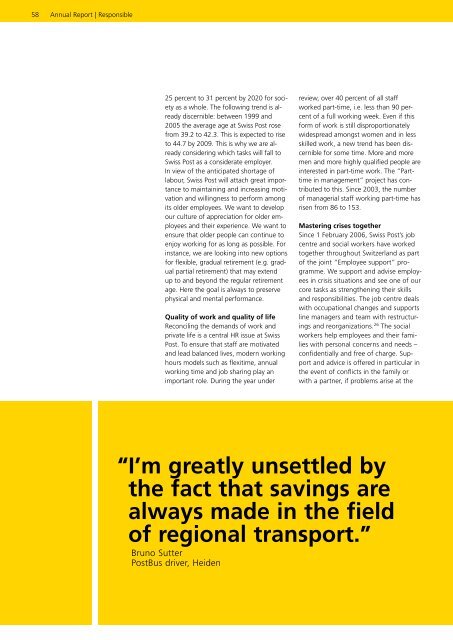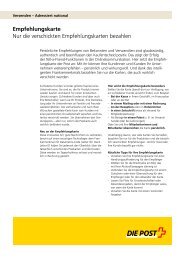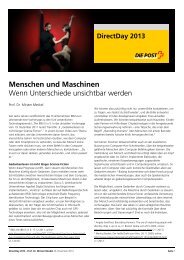Service-oriented - Die Schweizerische Post
Service-oriented - Die Schweizerische Post
Service-oriented - Die Schweizerische Post
Create successful ePaper yourself
Turn your PDF publications into a flip-book with our unique Google optimized e-Paper software.
58 Annual Geschäftsbericht Report | Responsible 2006<br />
25 percent to 31 percent by 2020 for society<br />
as a whole. The following trend is already<br />
discernible: between 1999 and<br />
2005 the average age at Swiss <strong>Post</strong> rose<br />
from 39.2 to 42.3. This is expected to rise<br />
to 44.7 by 2009. This is why we are already<br />
considering which tasks will fall to<br />
Swiss <strong>Post</strong> as a considerate employer.<br />
In view of the anticipated shortage of<br />
labour, Swiss <strong>Post</strong> will attach great importance<br />
to maintaining and increasing motivation<br />
and willingness to perform among<br />
its older employees. We want to develop<br />
our culture of appreciation for older employees<br />
and their experience. We want to<br />
ensure that older people can continue to<br />
enjoy working for as long as possible. For<br />
instance, we are looking into new options<br />
for flexible, gradual retirement (e.g. gradual<br />
partial retirement) that may extend<br />
up to and beyond the regular retirement<br />
age. Here the goal is always to preserve<br />
physical and mental performance.<br />
Quality of work and quality of life<br />
Reconciling the demands of work and<br />
private life is a central HR issue at Swiss<br />
<strong>Post</strong>. To ensure that staff are motivated<br />
and lead balanced lives, modern working<br />
hours models such as flexitime, annual<br />
working time and job sharing play an<br />
important role. uring the year under<br />
review, over 40 percent of all staff<br />
worked part-time, i.e. less than 90 percent<br />
of a full working week. Even if this<br />
form of work is still disproportionately<br />
widespread amongst women and in less<br />
skilled work, a new trend has been discernible<br />
for some time. More and more<br />
men and more highly qualified people are<br />
interested in part-time work. The “Parttime<br />
in management” project has contributed<br />
to this. Since 2003, the number<br />
of managerial staff working part-time has<br />
risen from 86 to 153.<br />
Mastering crises together<br />
Since 1 February 2006, Swiss <strong>Post</strong>’s job<br />
centre and social workers have worked<br />
together throughout Switzerland as part<br />
of the joint “Employee support” programme.<br />
We support and advise employees<br />
in crisis situations and see one of our<br />
core tasks as strengthening their skills<br />
and responsibilities. The job centre deals<br />
with occupational changes and supports<br />
line managers and team with restructurings<br />
and reorganizations. 26 The social<br />
workers help employees and their families<br />
with personal concerns and needs –<br />
confidentially and free of charge. Support<br />
and advice is offered in particular in<br />
the event of conflicts in the family or<br />
with a partner, if problems arise at the<br />
“ I’m greatly unsettled by<br />
the fact that savings are<br />
always made in the field<br />
of regional transport.”<br />
Bruno Sutter<br />
<strong>Post</strong>Bus driver, Heiden

















